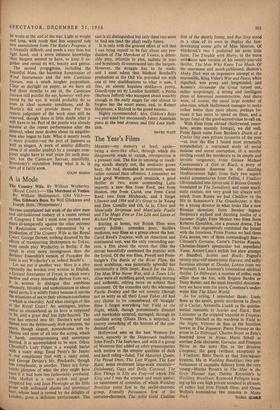The Year's Films
MEMORY—my memory at least, again— being a sieve-like affair, through which the disagreeable tends to vanish, retrospection is a pleasant task. The fine or amusing or touch- ing stands sharply out, the mediocre grows hazy, the bad, shrouded in sentiment, seems rather comical than offensive. 1 remember we had good Westerns, good musicals, a good thriller or two, some outstanding Latin imports; a new film from Ford, one from Huston, one from Carts& one from Carol Reed, two from Hitchcock; and I forget Liberate and 1984 and It's Great to be Young and Don Camillo and Oh, la la, Cheri and Marn'zelle Striptease and Mam'zelle Pigalle and The Magic Fire or The Life and Loves of Richard Wagner.
Starting at home, our British films were mostly dullish: comedies poor, thrillers mediocre, war films as a group about the best. Carol Reed's Trapeze, with an American and continental cast, was the only resounding suc- cess, a film about the circus that (like the circus) beautifully combined the popular with the lyrical. Of the war films, Powell and Press- burger's The Battle of the River Plate, the most ambitious, was pictorially splendid but emotionally a little inept; Reach for the Sky, The Mart Who Never Was, and A Town Like Alice were all middling good, middling moving and authentic, relying more on subject than treatment. Of the comedies only the whimsical Pacific Destiny and the not unwitty (though not as witty as all that) Loser Takes All had any claims to be remembered. Of 'straight' films I forget everything but Yield to the Night, which, though pretentiously directed and mawkishly scripted, managed, through its excellent acting (Diana Dors, a surprise), to convey something of the horrors of the con- demned cell.
Hollywood sent us the best Western for years, squarely in the Stagecoach tradition, John Ford's The Searchers, and with it a group of Westerns that added an adult preoccupation with motive to the simpler qualities of dash and hard riding—Jubal, The Maverick Queen, The Proud Ones, The Last Wagon, The Last Hunt; some exuberant large-scale musicals— Oklahoma!, Guys and Dolls, Carousel, The Best Things in Life are Free—of which The King and 1 was the crispest and most genial; an assortment of comedies, of which Wedding Breakfast came first in the realist-domestic group, Friendly Persuasion first of the costume-charmers, The Solid Gold Cadillac first of the sheerly funny, and Bus Stop stood in a class of its own to display the fast- developing comic gifts of Miss Monroe. Of Hitchcock's two I preferred his eerie little farce, The Trouble with Harry, to the more ambitious new version of his twenty-year-old thriller, The Man Who Knew Too Much. Of the enormous and much-publicised, Huston's Moby Dick was an impressive attempt at the impossible, King Vidor's War and Peace, while dignified, was prosy and longwinded, and Rossen's Alexander the Great turned out, rather surprisingly, a strong and intelligent piece of historical reconstruction. And there were, of course, the usual large number of also-rans, which Hollywood manages to make rather better than most places, perhaps be- cause it has more to spend on them, and a larger fund of the good-second-class to call on.
With films from abroad (Hollywood, some- how, seems scarcely foreign), we did well. From Spain came Juan Bardcm's Death of a Cyclist (my own private favourite of the year —at least the film I found most personally sympathetic), a restrained study of social malaise and secret corruption, of a murder circling round the murderers to its simple and terrible vengeance; from Greece Michael Cacoyannis's A Girl in Black, a story of Mediterranean dourness in the dazzling Mediterranean light; from Italy two superb social commentaries from Fellini, I Vitelloni (ill-translated into Spivs) and 11 Bidone (loosely translated as The Swindlers), and some small- scale realism, not very good but always well acted; from Russia we had Chekhov to the life in Samsonov's The Grasshopper, a film by a young director in what looks like a new Russian direction; from Sweden Ingmar Bergman's stylised and dazzling Smiles of a Summer Night; from Mexico two films from Roberto Gavaldon, one a peasant drama, The Shawl, that impressively combined the lyrical with the ferocious. From France we had three Zola stories, two of them outstandingly fine- Clement's Gervaise, Carnes Therese Raquin, Christian-Jaque's spectacular but superficial Nana; Autant-Lara's stylish but slow attempt at Stendhal, Scarlet and Black; Pagnol's twenty-year-old masterpiece Harvest, and sadly facetious attempt at Daudet, Letters from my Windmill; Leo Joannon's tremendous spiritual thriller, Le Defroque; a number of trifles, each sillier than the last, with Brigitte Bardot or Dany Robin; and the most beautiful documen- tary we have seen for years, Cousteau's under- water film The Silent World.
' As for acting, I remember these: Lucia Bose as the spoilt, gentle murderess in Death of a Cyclist; Antonella Lualdi as the quintes- sential romantic in Scarlet and Black; Burt Lancaster as the crippled trapezist in Trapeze; Yvonne Mitchell as the wardress in Yield to the Night; Vittorio de Sica as the heartless lawyer in The Bigamist; Pierre Fresnay as the priest in Le Defroque; Charles Boyer as Zola's besotted lover in Nana; Maria Schell as another Zola character, Gervaise, and Francois ['drier in the same film as the drunken Coupeau; the gang (without exception) in I Vitelloni; Bette Davis as that four-square hysteric, Ma in Wedding Breakfast; two per- formances of exquisite delicacy from the very young—Marisa Pavan's in The Man in the Grey Flannel Suit, - Debbie Reynolds's in Wedding Breakfast; Raymond Pellegrin keep- ing up his own high private standard in all sorts of rather bad little French films; and Orson Welles's tremendous few minutes in Moby


































 Previous page
Previous page